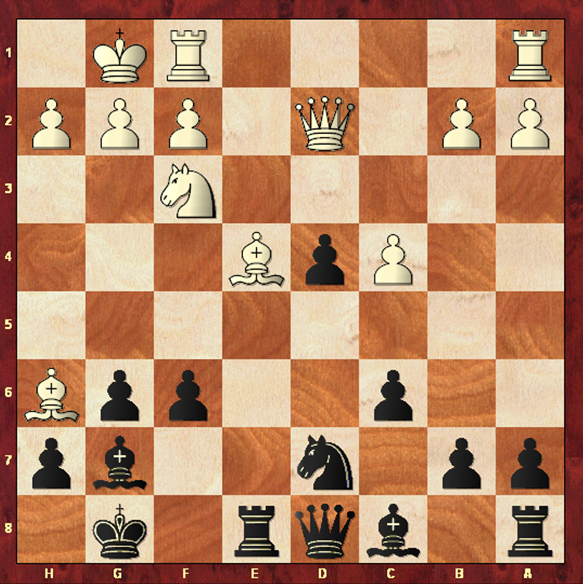
Emili is an amateur chess player. Occasionally, he plays chess in international opens, which for diverse reasons are enticing for both local non-professional club players and professional players from around the world. On 2000 June 16th, Emili played a chess game in one of such chess contests against Alexey Kuzmin, a Russian chess grand master (GM).
Kuzmin conducted the white pieces and Emili played with the black pieces. Playing white bears a certain advantage, because of the primary initiative conferred by the very first move in a chess game. A larger advantage of Kuzmin over Emili, however, stemmed in the difference of over 550 points in their respective Elo ratings, 2596 and 2025. The Elo rating describes the level of chess skill attained by amateur and professional chess players. Higher Elo ratings indicate higher levels of chess skill. The Elo rating held by the two contenders in a chess game predicts fairly well the chances of winning or losing. The winning chances for Kuzmin were about 96% in contrast with a meagre 4% for Emili.
The game opening was the Queen’s gambit declined semi-Slav, 5.e3 [D45], which led to a conventional chess game. Nonetheless, for somebody interested in human behaviour it was beguiling to watch both players in the course of the game. Emili won a pawn in the move 14, which was remarkable for an amateur player struggling with a GM. Then Emili became extremely excited. His facial expressions and motor behaviour manifested a hectic mixture of enthusiasm, nervousness, and tension. Several spectators were watching the game, some of them probably hoping to witness a bewildering defeat of the GM.
Kuzmin’s behaviour was the opposite pole to the behaviour displayed by Emili. The GM remained calmed, unemotional, and very relaxed. Kuzmin won a pawn himself in move 21 and a second pawn in move 26, even though preserving a peaceful, serene manner, and reflecting an emotionless mood. The nerves of Emili seemed close to collapse because at that moment, he had much less available thinking time than his opponent. Seven moves later Emili resigned.
Watching the game was quite instructive. Apart from the difference in the Elo ratings of both players, it highlighted subtle differences in the control of emotions in a domain with taxing intellectual and emotional requirements. Observations of human behaviour during chess playing and a background in differential psychology were the main motivations to write Chess and Individual Differences. The volume reviews a considerable amount of empirical studies in psychology that have used the chess domain in one way or other, and that have reported individual differences of several kinds. Common themes addressed in differential psychology are thoroughly reviewed in the book, such as intelligence and personality. Other topics of interest include psychophysiology and brain studies, expertise, sex differences, and the applications of chess in real life domains such as in business, health, and school.

Move 14 … exd4 Emili wins a pawn against Kuzmin!
Kuzmin, A (2596) Ortoneda, (2025)

[D45] Balaguer (1), 16.07.2000
1. d4 Nf6
2. c4 e6
3. Nf3 d5
4. Nc3 c6
5. e3 g6
6. Bd3 Bg7
7. 0–0 0–0
8. e4 d×e4
9. N×e4 Nbd7
10. Bf4 N×e4
11. B×e4 Re8
12. Qd2 e5
13. Bg5 f6
14. Bh6 e×d4
15. B×g7 R×e4
16. Bh6 c5
17. Rfe1 R×e1+
18. R×e1 Nb6
19. Qf4 Bd7
20. Qe4 Rc8
21. Q×b7 Qc7
22. Qa6 Re8
23. Qa5 R×e1+
24. Q×e1 Qd6
25. Qa5 g5
26. Q×a7 d3
27. Nd2 Nc8
28. Qb7 Ne7
29. Qa8+ Bc8
30. Qe4 Bf5
31. Qe3 Qe6
32. Q×e6+ B×e6
33. h4 1–0
Latest Comments
Have your say!